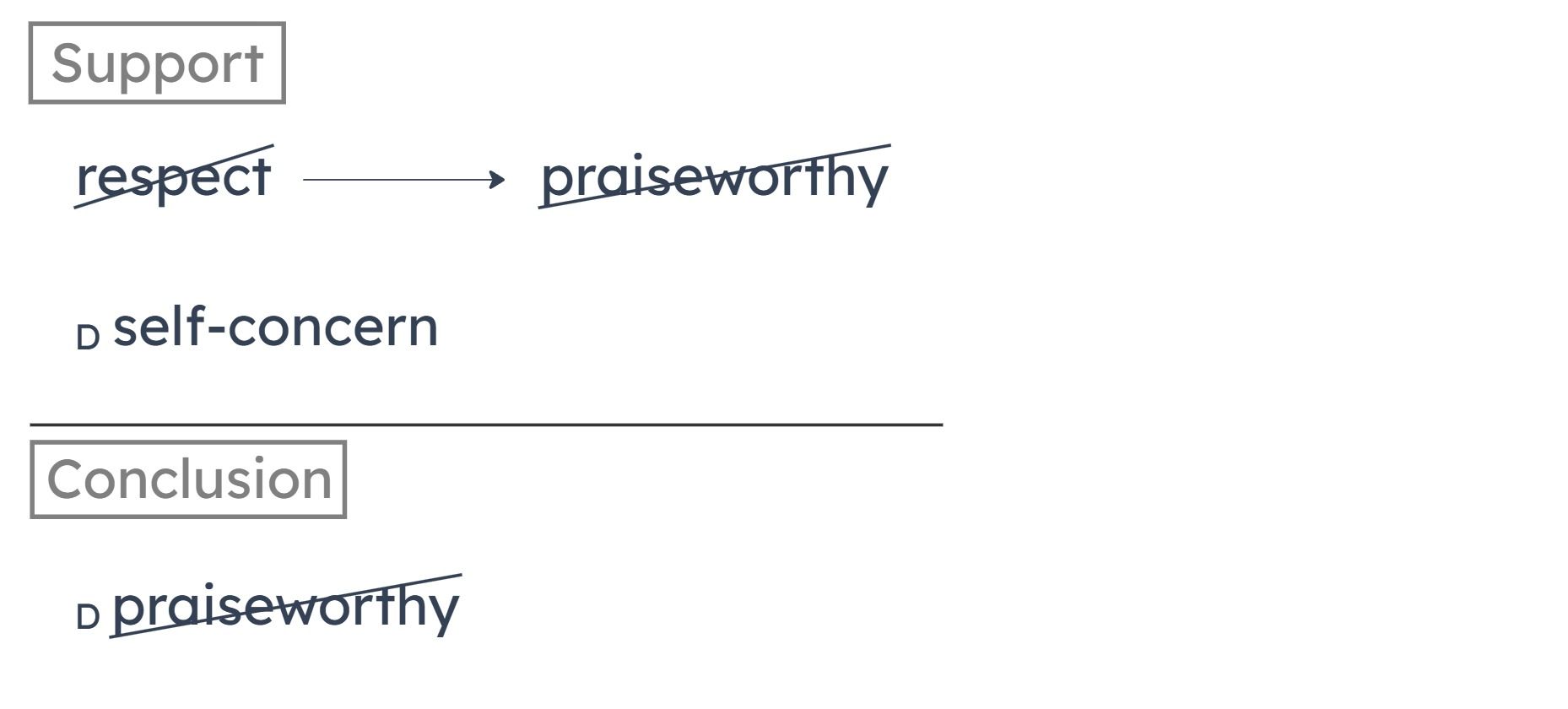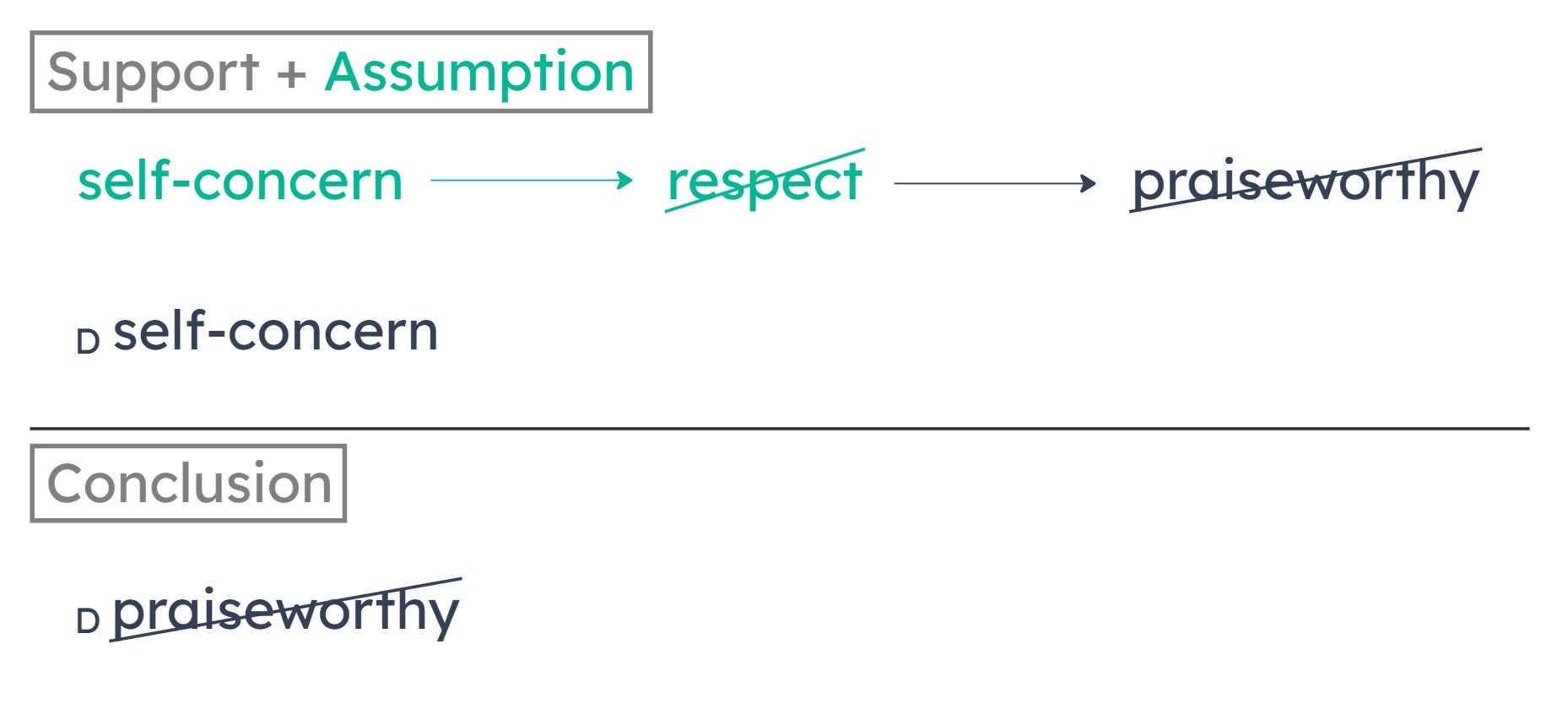Summary
The author concludes that Downing did not act in a praiseworthy manner when he told the truth about his partner’s fraud. This is based on the following:
Downing was motivated by concern for his own well-being.
In order for it to be morally praiseworthy to be honest, it is necessary that the honesty be done out of respect for morality.
Downing was motivated by concern for his own well-being.
In order for it to be morally praiseworthy to be honest, it is necessary that the honesty be done out of respect for morality.

Missing Connection
We know from the premises that if one’s honesty is not motivated by respect for morality, one does not deserve praise for that honesty. So in theory we could conclude that Downing did not act in a way that deserves praise...as long as we know he was not motivated by respect for morality.
Another premise tells us that Downing was motivated by self-concern. Does this guarantee that he was not motivated by respect for morality? Not necessarily, since someone can have multiple motivations. To make this argument valid, then, we want to establish that if someone’s motivation is self-concern, then they cannot also be motivated by morality.
Another premise tells us that Downing was motivated by self-concern. Does this guarantee that he was not motivated by respect for morality? Not necessarily, since someone can have multiple motivations. To make this argument valid, then, we want to establish that if someone’s motivation is self-concern, then they cannot also be motivated by morality.
A
An action motivated by concern for oneself cannot be deserving of moral condemnation.
We want to know that actions motivated by self-concern can’t be motivated by morality. (A) merely establishes that actions motivated by self-concern don’t deserve condemnation. This leaves open the possibility that Downing was still motivated by morality.
B
Some actions that are essentially honest are not morally praiseworthy.
Learning at least one (”some”) action that is honest isn’t morally praiseworthy does not prove that Downing’s action is not praiseworthy. The particular actions that are praiseworthy in (B) might refer to other actions. (Remember, this is a Suff. Assump. question. Not a MBT or MSS.)
C
An action performed out of respect for morality cannot also be an action motivated by concern for oneself.
(C) establishes that Downing’s action, which was motivated by self-concern, was not also motivated by morality. And this in turn proves that Downing’s action did not meet what’s necessary in order to be considered morally praiseworthy.

D
The moral praiseworthiness of an action can be judged only according to standards that refer to the circumstances of the person acting.
(D) doesn’t establish that Downing’s action was not motivated by morality. So it leaves open the possibility that Downing’s action can be morally praiseworthy.
E
Morality demands that one be honest, even in cases where this could be detrimental to one’s own well-being.
(E) doesn’t establish that Downing’s action was not motivated by morality. So it leaves open the possibility that Downing’s action can be morally praiseworthy.
Fatuma: Newspaper writing is hampered by conventions that do not add to readers’ understanding of the news. It is not the fault of technology that newspapers are losing their audience to the Internet. Newspaper articles are just too long. On the Internet, news articles get to the point.
Speaker 1 Summary
Mark concludes that advances in technology have caused the decline of newspaper sales. As support, Mark asserts that news can be reported in online articles as it happens and at any time of the day. This isn’t something a print newspaper can do.
Speaker 2 Summary
Fatuma concludes that technology is not the reason that newspapers are losing their audience to the Internet. As support, Fatuma asserts that writing in print news articles is too long, whereas online news articles are not. The lengthy print news articles are a convention of print news. They aren’t a product of technology.
Objective
We’re looking for a point of disagreement. The speakers disagree about whether technology is the cause of the decline in newspaper sales.
A
Readers are abandoning newspapers in favor of news articles on the Internet because of the speed with which they appear on the Internet.
This is a point of disagreement. Mark cites the fact news can appear instantly online as a reason that technology has caused the decline in newspaper sales. Fatuma does not blame timing. She instead blames the length of newspaper articles.
B
Newspaper articles are too long.
Mark does not express an opinion about this. He doesn’t discuss the length of newspaper articles. Although we can infer he doesn’t think length is the reason newspaper sales are declining, that doesn’t mean he thinks newspaper articles are of an appropriate length.
C
News articles on the Internet get to the point.
Mark does not express an opinion about this. He doesn’t discuss the length of online articles. Although we can infer he doesn’t think length is the reason newspaper sales are declining, that doesn’t mean he thinks online articles do or do not get to the point.
D
Newspaper writing is hampered by conventions that do not add to the reader’s understanding of the news.
Mark doesn’t express an opinion about this. Although he does not believe newspaper conventions are the cause of declining newspaper sales, he might still agree that these bad conventions exist. He can think these conventions, while bad for readers, don’t cause lower sales.
E
No print newspaper can possibly publish news as fast as it can be published on the Internet.
Fatuma doesn’t express an opinion about this. Although she thinks the timing afforded by technology is not the cause of declining newspaper sales, she can still agree that newspapers cannot publish as fast as online publications can.
"Surprising" Phenomenon
Why did restaurants see an increase in sales when the city raised the rate on downtown parking?
Objective
The correct answer will be a hypothesis that explains why an increased short-term parking rate would help downtown restaurants, despite their customers needing short-term parking rate. The explanation must provide some rationale for why people are more likely to go to the restaurant despite higher parking costs.
A
Customers of the district’s businesses can also use private parking lots, which are generally more expensive than on-street parking.
We need to know why restaurants did better after the rate increase than before. These other lots are simply a constant that don’t factor into the apparent paradox.
B
Owners of the district’s businesses, for the most part, initially opposed the raising of the on-street parking rates.
It doesn’t matter what owners think of the new parking rate. We need to know why that rate had the effect it did.
C
Even before the change in parking rates, the staffs of the businesses in the district used only off-street parking.
If anything, this eliminates a possible explanation that the new rate freed up more parking for customers. We need something that explains why the new rate helped restaurants.
D
More expensive parking leads to greater turnover in cars parked in front of the businesses in the district.
Since the new rate leads to higher turnover, more people are parking in front of the restaurant than before. The restaurants thus have more potential customers throughout the day, hence why their profits have increased.
E
The business district is in competition with malls that offer free parking to their customers.
If anything, the new rate would seem to hurt the restaurants even more if customers had a free alternative elsewhere. This doesn’t explain how the new rate helped restaurants.
Bettina: Student evaluations of teachers are usually conducted at the end of a class. However, students generally fail to appreciate the impact of a teacher until many years later. So, peer evaluations of teachers might be a good supplement or a better alternative.
Speaker 1 Summary
Student evaluations are the best assessment of teacher performance. Why? Because students are in a better position to judge a teacher.
Speaker 2 Summary
Peer evaluations may be a better alternative to assess teacher performance. Why? Because students generally fail to appreciate the impact of a teacher until years later, and student evaluations are conducted at the end of a class
Objective
We need a statement Oscar and Bettina disagree on. They disagree whether student evaluations are the best way to evaluate teachers. Oscar thinks that student evaluations are the best way to evaluate teachers. Bettina thinks peer evaluations could be a better alternative because students don’t appreciate the impact of a teacher until many years after a class.
A
students are ever capable of adequately judging a teacher’s performance
Bettina does not express an opinion on this statement. Bettina thinks that peer evaluations may be better for judging a teacher’s performance, but that does not mean Bettina thinks students are capable or incapable of the same.
B
students’ opinions may change over a period of many years
Oscar does not express an opinion on this statement. Oscar only concludes that students are the best group to judge a teacher’s performance, he does not express an opinion about what students’ opinions are.
C
student evaluations furnish the optimal assessment of teacher performance
Oscar and Bettina disagree on this statement. Oscar would agree that student evaluations are optimal. Bettina would disagree because students don’t appreciate the impact of a teacher until years later.
D
teacher performance should be assessed without conducting any student evaluations
Bettina does not express an opinion on this statement. Bettina thinks peer evaluations may be a better alternative to student evaluations, but she does not express that student evaluations should never be used.
E
student evaluations are usually conducted at the end of a class
Oscar does not express an opinion on this statement. We can’t assume Oscar thinks or knows when student evaluations are conducted from his conclusion that student evaluations are the best in terms of judging teacher performance.